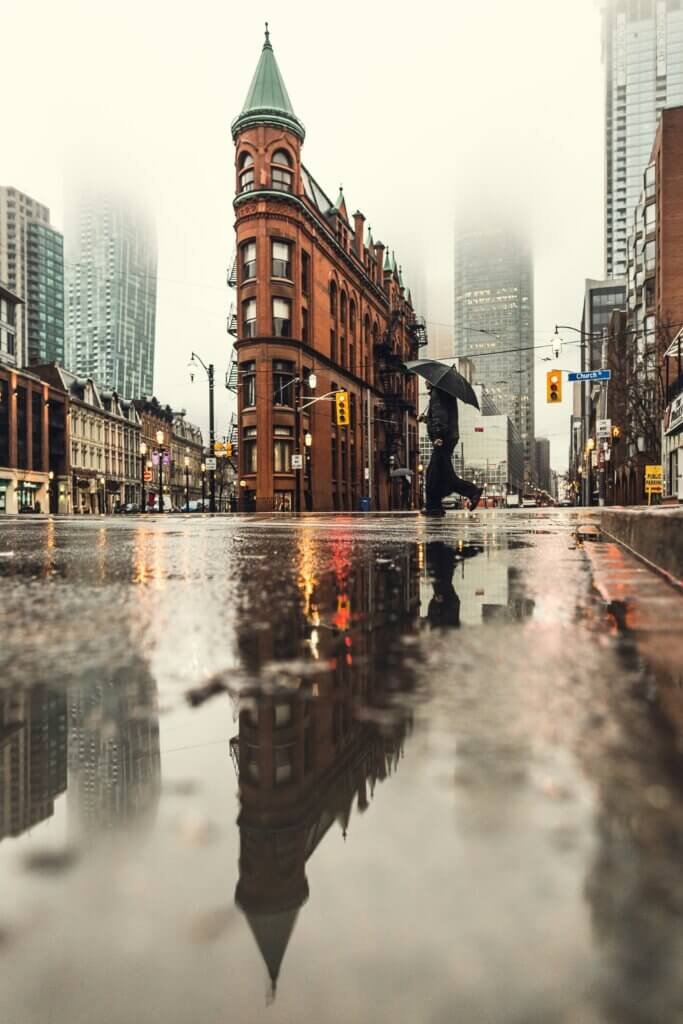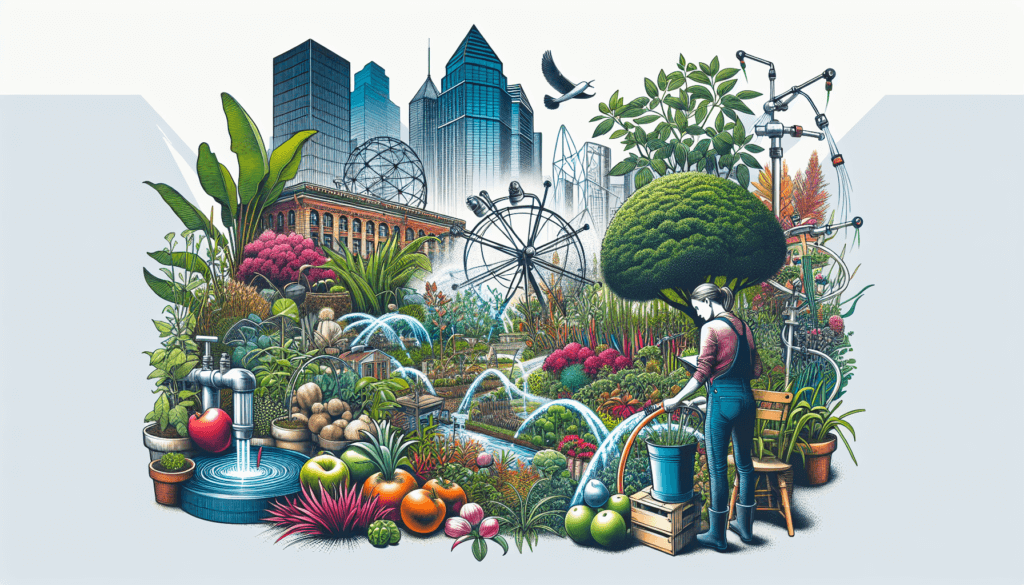Are you a city dweller with a green thumb, but often find yourself struggling to maintain your urban garden when you go on vacation? Fear not! In this article, we will share some practical tips and tricks to help you keep your plants healthy and thriving while you’re away. From automated watering systems to plant sitters, we’ve got you covered so that you can enjoy your time off without worrying about the fate of your beloved garden. So, pack your bags and get ready to embark on your next adventure, knowing that your urban oasis will be just as lush and vibrant when you return.

Choosing the Right Plants
Consider Low Maintenance Plants
When planning an urban garden that you will be leaving for extended periods of time, it’s important to choose plants that require minimal care and attention. Opt for plants that are known for their low maintenance characteristics. These types of plants can withstand neglect and will thrive even if you can’t be there to tend to them regularly. Some examples of low maintenance plants include succulents, cacti, and certain varieties of herbs.
Opt for Drought-Tolerant Varieties
Another factor to consider when selecting plants for your urban garden is their ability to tolerate drought conditions. Since you won’t be around to provide regular watering, it’s essential to choose plants that can survive with minimal moisture. Drought-tolerant plants have the ability to store water in their leaves, stems, or roots, allowing them to withstand periods of dryness. Some popular choices for drought-tolerant plants include lavender, agave, and yucca.
Select Self-Pollinating Plants
When you’re away from your garden, it’s important to choose plants that are self-pollinating. These plants have the ability to pollinate themselves without the need for insects or wind. Self-pollinating plants are an excellent choice for urban gardeners who won’t be present to manually pollinate their plants. Some common self-pollinating plants include tomatoes, peppers, and beans.
Grow Perennials for Easy Maintenance
Growing perennial plants in your urban garden can significantly reduce the maintenance required, especially when you’re away. Perennials are plants that live for more than two years and come back to life each spring. These plants have deep roots that can access water and nutrients from deeper in the soil, making them more resilient to drought conditions. In addition, perennials typically require less pruning and fertilizing compared to annuals. Consider planting perennials such as lavender, daylilies, and coneflowers for an easy-to-maintain urban garden.
Automated Watering Systems
Install Drip Irrigation Systems
One of the most effective ways to ensure that your urban garden receives the water it needs while you’re traveling is by installing a drip irrigation system. Drip irrigation systems provide a slow, steady supply of water directly to the base of your plants, minimizing water waste while effectively hydrating your garden. These systems can be customized to deliver water at specific intervals, making them an ideal solution for maintaining the moisture levels in your plants’ root zones.
Set Up a Timer System
A timer system is a simple yet effective way to automate the watering process in your urban garden while you’re away. By connecting your garden’s irrigation system to a timer, you can program it to water your plants at specific times and for specific durations. This ensures that your plants will receive the right amount of water without the need for manual intervention. Timers can be easily set up and adjusted to account for changes in weather conditions, making them a convenient solution for maintaining your garden’s hydration needs.
Use Self-Watering Planters
Another option for automated watering is to utilize self-watering planters. These planters have a reservoir at the bottom that holds water, which is then gradually absorbed by the plants’ roots. Self-watering planters are designed to provide plants with a consistent supply of moisture, reducing the need for frequent watering. These planters are especially useful for potted plants, allowing them to thrive even in your absence. Simply fill the reservoir before you leave, and your plants will receive water as needed.

Mulching for Moisture Retention
Apply Mulch to Retain Moisture
Mulching your urban garden is a great way to retain moisture in the soil and reduce evaporation. By spreading a layer of organic materials such as wood chips, straw, or shredded leaves around your plants, you create a protective barrier that helps to lock in moisture. Mulch also helps to regulate soil temperature and prevent weed growth. Before leaving for your trip, make sure to apply a thick layer of mulch to all your garden beds.
Use Organic Mulch for Nutrients
In addition to retaining moisture, organic mulch also provides essential nutrients to your plants as it decomposes over time. As the mulch breaks down, it releases valuable nutrients into the soil, helping to improve the overall health and fertility of your garden. Organic mulch options such as compost, grass clippings, or straw are rich in nutrients and support the growth of beneficial soil organisms. By using organic mulch, you’ll be helping your garden to thrive even in your absence.
Mulch to Prevent Weeds
Mulching provides an effective natural barrier against weeds, reducing the need for manual weed removal. By blocking sunlight from reaching the soil, mulch prevents weed seeds from germinating and competing with your plants for resources. This helps to maintain a clean and weed-free garden while you’re away. By applying mulch around your plants and in between rows, you can significantly reduce the need for weeding, allowing your garden to flourish with minimal maintenance.
Implementing Effective Soil Management
Ensure Adequate Nutrient Levels
Before leaving for your trip, it’s essential to ensure that your soil has adequate nutrient levels to support the growth of your plants. Conduct a soil test to determine the nutrient levels and pH of your soil, and make any necessary amendments based on the results. Adding organic matter such as compost or well-rotted manure can help to replenish nutrients and improve soil fertility. By providing your plants with the necessary nutrients, you’ll ensure they have the best chance of thriving while you’re away.
Amend Soil with Organic Matter
Incorporating organic matter into your soil is crucial for maintaining its structure, moisture-holding capacity, and overall health. Organic matter improves soil structure by increasing its ability to retain water and nutrients, as well as promoting beneficial microbial activity. Before you depart, amend your soil with compost, leaf mold, or well-rotted manure to enhance its fertility and provide a favorable environment for plant growth. Your urban garden will benefit from the improved soil quality even in your absence.
Perform Regular Soil Testing
Regular soil testing is essential for maintaining the health and productivity of your urban garden. By testing your soil at least once a year, you can determine its nutrient content, pH level, and overall condition. This information will help you make informed decisions about fertilizing and amending your soil, ensuring that your plants receive the necessary nutrients for optimal growth. Soil testing kits are readily available and can provide valuable insights into the state of your garden’s soil.

Setting Up Shade and Wind Barriers
Protect Plants from Extreme Heat
When you’re away from your urban garden, it’s important to protect your plants from extreme heat to maintain their health and vitality. Consider setting up shade structures, such as umbrellas or shade cloths, to shield your plants from direct sunlight during the hottest parts of the day. Installing shade structures not only helps to prevent sunburn and wilting but also reduces the amount of water your plants will need, as the shade keeps the soil cooler and slows down evaporation.
Create Windbreaks for Strong Winds
Strong winds can cause significant damage to your urban garden, especially during storms or windy periods. To protect your plants from wind damage, consider creating windbreaks using structures such as trellises, fences, or hedges. These barriers help to break up strong winds and create a sheltered area for your plants to grow. Choose materials that are sturdy and can withstand strong gusts, ensuring that your windbreaks will effectively protect your garden in your absence.
Use Shade Cloths to Shield Plants
Shade cloths are an excellent tool for shielding your plants from intense sunlight while still allowing air circulation. These cloths can be easily installed and provide a layer of shade that helps to regulate the temperature and protect your plants from heat stress. Shade cloths come in various densities, allowing you to control the amount of shade provided. Attach the shade cloth to a structure above your garden beds to create a comfortable environment for your plants to thrive.
Finding a Reliable Garden Sitter
Ask Friends or Neighbors for Help
If you have friends or neighbors who are also into gardening, why not ask them to help take care of your urban garden while you’re away? A reliable garden sitter can visit your garden periodically to check on the plants, water them if necessary, and address any urgent issues that may arise. By entrusting your garden to someone you know and trust, you can have peace of mind knowing that your plants are in capable hands.
Hire a Professional Garden Sitter
If you don’t have anyone within your personal network who can take care of your garden, consider hiring a professional garden sitter. These individuals specialize in providing care for gardens and can offer a range of services to ensure that your plants are well looked after in your absence. Professional garden sitters can water, prune, fertilize, and perform other essential tasks to keep your garden healthy and thriving. Conduct thorough research and seek recommendations to find a reputable garden sitter in your area.
Exchange Garden Sitting with Other Gardeners
Another option for maintaining your urban garden while traveling is to participate in a garden sitting exchange. This involves finding another gardener who is also planning to go on a trip and offering to take care of their garden in exchange for them looking after yours. This arrangement allows both parties to enjoy their vacations while ensuring the well-being of their respective gardens. It’s a win-win situation that fosters a sense of community among urban gardeners and promotes mutual support.

Harvesting and Pruning Before Traveling
Collect Ripe Produce and Flowers
Before embarking on your trip, be sure to harvest any ripe produce or flowers from your urban garden. Leaving ripe fruits or vegetables on the plant for an extended period can attract pests and lead to overripening. Additionally, harvesting flowers before they wilt ensures that you can enjoy their beauty and prevents unnecessary energy expenditure by the plants. Collecting ripe produce and flowers not only benefits you but also benefits the overall health of your garden.
Prune and Deadhead Plants
Pruning and deadheading your plants before you leave can help to maintain their shape, encourage new growth, and reduce the risk of disease or pest infestation. Remove any dead or diseased branches, trim back overgrown foliage, and cut off faded flowers. By tidying up your plants, you’re helping them conserve energy and directing their growth in a desirable manner. Pruning and deadheading are essential tasks that can significantly contribute to the overall maintenance of your urban garden.
Remove Any Potential Pests
Inspect your plants thoroughly for any signs of pests or diseases before leaving for your trip. If you notice any pests or eggs, remove them manually or treat the affected plants with organic pest control methods. Taking proactive measures to eliminate potential pests will help to prevent infestations and minimize damage to your plants. By addressing potential pest issues early on, you’re ensuring the health and vitality of your urban garden while you’re away.
Arranging for Regular Maintenance
Arrange for a Gardener to Visit
If you prefer to leave the maintenance of your urban garden to a professional, you can arrange for a gardener to visit your garden regularly during your absence. A gardener can perform routine tasks such as watering, fertilizing, weeding, and pest control to keep your garden in excellent condition. Discuss your requirements and expectations with the gardener beforehand and prepare a detailed schedule to ensure that all necessary tasks are completed on time.
Hire a Lawn Care Service
If your urban garden includes a lawn or larger outdoor space, it may be beneficial to hire a lawn care service to maintain it while you’re away. These services specialize in lawn care, including mowing, edging, and general maintenance. By entrusting the care of your lawn to professionals, you can ensure that it remains healthy and well-maintained, even in your absence.
Create a Garden Maintenance Schedule
Before you leave, create a detailed garden maintenance schedule that outlines all the tasks that need to be done to keep your urban garden in good shape. Include tasks such as watering, fertilizing, weeding, pruning, and pest control, along with specific instructions and timeframes. This schedule will serve as a guide for anyone who may be taking care of your garden, ensuring that everything is done promptly and correctly. Make sure to communicate your expectations clearly and provide any necessary tools or supplies.

Protecting Plants from Pests
Implement Organic Pest Control Methods
When it comes to pest control in your urban garden, it’s best to opt for organic methods that are safe for your plants and the environment. Organic pest control techniques include using natural predators, such as ladybugs or praying mantis, to control pests, as well as making homemade sprays using natural ingredients like neem oil or garlic. By choosing organic pest control methods, you can effectively manage pests without the use of harmful chemicals.
Use Natural Deterrents
In addition to organic pest control methods, you can deter pests from your urban garden by using natural deterrents. For example, planting companion plants that repel pests, such as marigolds to deter aphids or basil to repel mosquitoes, can help to keep unwanted visitors at bay. Additionally, sprinkling crushed eggshells or coffee grounds around your plants can act as a barrier and deter pests. Experiment with different natural deterrents to find what works best for your specific garden and pest issues.
Install Physical Barriers for Pest Exclusion
If you’re dealing with persistent pests or specific critters that are causing damage to your urban garden, installing physical barriers can be an effective solution. Use fine mesh netting or wire fencing to protect your plants from birds, rabbits, or other animals that may snack on your vegetation. Elevated planters or cages can also be used to keep certain pests away. By implementing physical barriers, you can create a barrier between your plants and potential pests, ensuring their safety and well-being.
Having a Backup System for Emergencies
Leave Detailed Care Instructions
Before you leave for your trip, it’s crucial to provide detailed care instructions for your urban garden. Include information such as watering schedules, fertilization requirements, and any specific tasks that need to be done. Leave clear instructions on how to handle potential issues such as pest infestations or extreme weather conditions. By providing comprehensive care instructions, you’re ensuring that anyone taking care of your garden has all the necessary information to keep your plants healthy and thriving.
Provide Emergency Contact Information
In case of any emergencies or unforeseen circumstances, it’s important to provide contact information for yourself or a trusted individual who can assist with urgent garden matters. Include phone numbers, email addresses, and any other relevant contact information that the caretaker can use to reach you. This way, if any critical situations arise, you can be notified promptly and provide guidance or support remotely.
Arrange for Backup Watering if Needed
If you live in an area with unreliable water supply or anticipate extended periods without rainfall, it may be necessary to arrange for backup watering for your urban garden. This could involve asking a neighbor or friend to water your plants when needed or setting up an automatic watering system that can be remotely controlled. By ensuring that your plants receive adequate water during your absence, you’re minimizing the risk of dehydration and promoting their overall health and well-being.
Maintaining a successful urban garden while traveling requires careful planning and preparation. By selecting the right plants, implementing automated watering systems, managing soil effectively, protecting against pests and external factors, arranging for garden sitting or maintenance, and having backup systems in place, you can enjoy your trip knowing that your garden is well taken care of. With these strategies in place, you can continue to nurture your urban oasis and return to a thriving garden upon your arrival back home.

